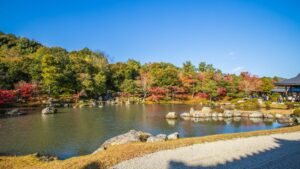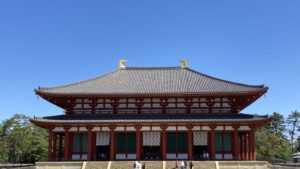Kenrokuen, a Scenic Garden, the Maeda Clan's Survival Strategy
Kenrokuen, a strolling-style garden featuring ponds, hills, and tea houses, is renowned as one of Japan’s most exquisite gardens, alongside Korakuen in Okayama and Kairakuen in Mito. Situated in Kanazawa City, the heart of the Kaga domain until the end of the Edo period (1603~1868), Kenrokuen has been expanded since its founding, with the additional planting of well-shaped trees until 1851. The lords created three islands within the garden’s ponds, inspired by the concept of immortal Shenxian deities, symbolizing their wishes for long life and everlasting prosperity.
The Kaga domain was a cultural center throughout the Edo period, nurturing craftsmen, gardeners, chefs, and tea masters in various traditional crafts. Many cultural traditions have evolved over 300 years, including gold leaf, Kaga Lacquer, Kutani Porcelain, Kaga Yuzen dyed silk fabrics, Kaga cuisine, and Kaga confectionery. How did the Kaga domain endure through the Edo period while others lost their territories to the Tokugawa shogunate? The Kaga domain’s cultural power holds the key to this mystery.
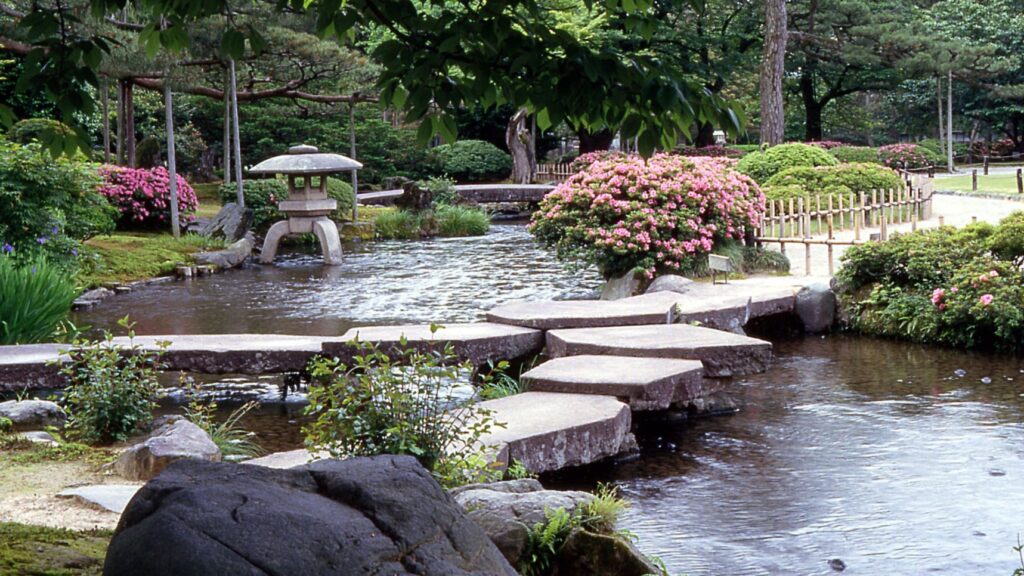
Toshiie's Building the Foundation of the Kaga Domain
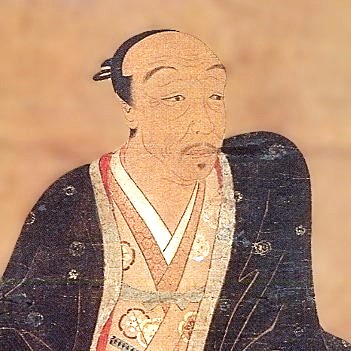
Let’s dive into the history of the Kaga domain, beginning with its first feudal lord, Maeda Toshiie (1538-1599, 前田利家). Toshiie started serving Oda Nobunaga (1534-1582, 織田信長) in 1551, playing a significant role in Nobunaga's territorial expansion. As the leader of Nobunaga's elite force, the Akahoro Shu, Toshiie demonstrated his military prowess in many battles, notably the Battles of Okehazama against Imagawa Yoshimoto, the Battle of Nagashino, Osaka Honganji War, among others. Nobunaga had high expectations for Toshiie and arranged for his daughter to be the wife of his eldest son, Toshinaga. Simultaneously, Toshiie made his daughter, Gou, the adopted daughter of his colleague, Toyotomi Hideyoshi (1537-1598, 豊臣秀吉), who was not blessed with children.
Following Nobunaga's assassination at Honnoji Temple in 1582, Toshiie served under Hideyoshi, relocating his headquarters to Kanazawa Castle as his territory expanded to include two more areas in Kaga Province. Under the Toyotomi regime, Toshiie became one of the Council of Five Elders and a guardian of Hideyoshi's heir, Toyotomi Hideyori (1593-1615, 豊臣秀頼). After Hideyoshi's death, Toshiie held a distinguished position alongside Tokugawa Ieyasu (1543-1616, 徳川家康), dedicating himself to the continued management of the Toyotomi administration.
Toshinaga's Patience with Ieyasu
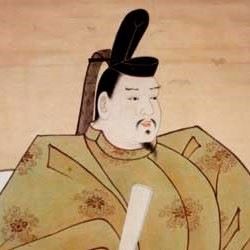
Six months after Toshiie died in 1599, Toshinaga (1562-1614, 前田利長) left Osaka Castle and returned to Kanazawa against his father's will that he should stay in Osaka for three years. It is believed that Tokugawa Ieyasu, who assumed control of the Toyotomi regime's political affairs at Osaka Castle, kept Toshinaga away from Hideyori and effectively excluded him from the center of power. To demonstrate submission to Ieyasu, Toshinaga sent his mother, Matsu, to Edo as a hostage. Toshinaga's actions were driven by a commitment to ensuring the survival of the Maeda clan and the stability of the Kaga domain.
However, several of his vassals remained aligned with the anti-Tokugawa factions, and Toshinaga struggled to control them. In 1613, a daughter of the second shogun, Tokugawa Hidetada, married Toshinaga’s brother and the next lord of the Kaga domain, Toshitsune (1594-1658, 前田利常), fostering a closer relationship between the Tokugawa and Maeda families. Following the Battle of Sekigahara, Toshinaga was granted additional territories, achieving the largest approximately 1 million koku(*) in Japan. Furthermore, the Maeda family was the only non-Tokugawa family permitted to maintain the high rank of court nobility. Toshinaga's efforts to maintain the Kaga domain with his patience and diplomacy proved successful.
(*) Koku refers to the land value equivalent of about 150 kg of rice
Toshitsune's Playing the Fool
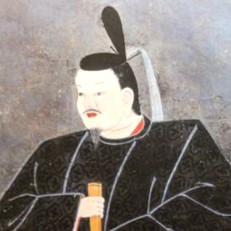
The Maeda clan faced another crisis during Toshitsune’s reign. In 1631, a rumor spread in Edo that the Maeda clan had rebelled against the Tokugawa shogunate. Toshitsune hurried to Edo to address the situation and ultimately dispelled the suspicion. To further convince the Tokugawa that the Maeda clan had no rebellious intentions, Toshitsune played the role of a foolish lord. He grew out his nose hair, creating an impression of a silly and harmless lord, and hosted nightly banquets to demonstrate his frivolity. This strategy ensured the Kaga domain’s survival, preventing it from being crushed by the Tokugawa shogunate. Remarkably, the Maeda clan of the Kaga domain survived while approximately 100 lords lost their territories.
Toshitsune Pours His Wealth of One Million Koku into Culture
Toshitsune invited many talented artists, craftsmen, and tea masters from Kyoto to Kaga, collaborating with the retired Emperor Go-Mizunoo (1596-1658, 後水尾天皇), Go-Mizunoo-In. He invested nearly all of his financial assets in cultural advancement, clearly signaling his intention not to raise a weapon against the Tokugawa shogunate. His era marked the beginning of the glory of the Kaga-Renaissance, a cultural flourishing comparable to the Imperial culture led by Go-Mizunoo-In.
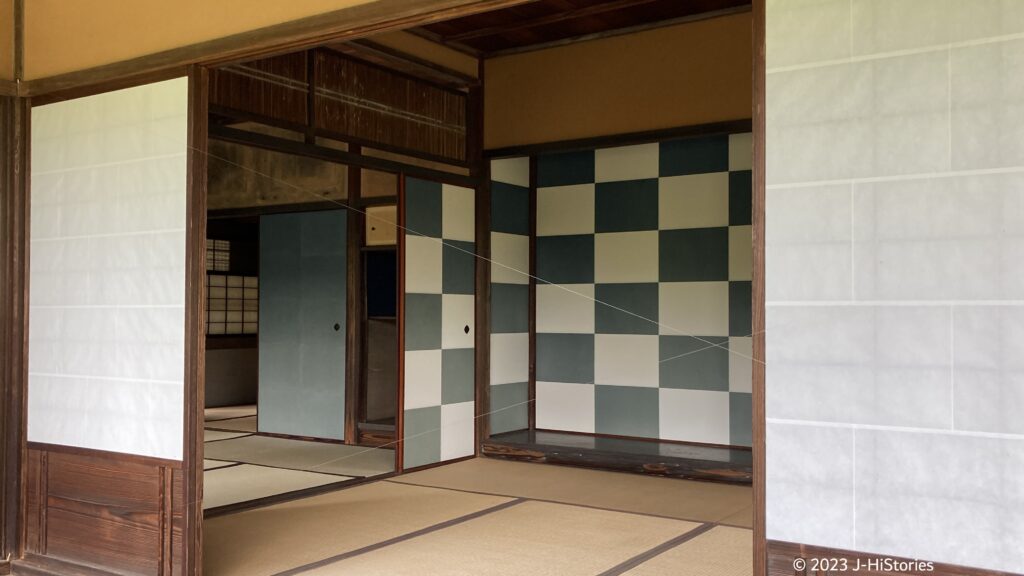
The ceiling design of Ao-no-ma (Blue room) at Seison Kaku (成巽閣), a residence built for the wives of the Maeda lords, is similar to the Ichimatsu-design fusuma (indigo and white checked pattern's sliding door) at Katsura Imperial Villa, established by Go-Mizunoo-In’s uncle, Prince Toshihito (1579-1629, 八条宮智仁親王) and his son, Prince Toshitada (1619-1662, 八条宮智忠親王). On the marriage of Fuhime, daughter of Toshitsune, to Prince Toshitada, the Katsura Imperial Palace was restored and enlarged with the support of the Kaga domain.
Toshitsune and Go-Mizunoo-In Shared their Sentiment for the Patience
The framed statement, or hengaku, displays the Kanji character “Shinobu (忍),” meaning “Patience,” which was said to have been hung at the Seison Kaku. This statement was given to Toshitsune by Go-Mizunoo-In. The character “Shinobu” encapsulates the shared sentiment of both Toshitsune and Go-Mizunoo-In: “Be patient in the face of the powerful Tokugawa shogunate to preserve and eventually win through superior cultural development.”
Toshiie, Toshinaga, and Toshitsune Protected the Kaga Domain
Enjoy a walk through the Kenrokuen Garden, which embodies the superior and artistic taste of both Imperial culture and samurai culture, reflecting the pride of the Maeda clan, the greatest feudal lord to endure through the Edo period following the Tokugawa. As you walk, immerse yourself in the rich heritage of Kaga crafts and arts, traditions that have been handed down, passed on, and continually developed for over 300 years.
Maeda clan Timeline
| Toshiie | Toshinaga | Toshitsune | Tokugawa Ieyasu | ||
|---|---|---|---|---|---|
| 1537 | Maeda Toshiie was born in Nagoya | 1 | |||
| 1560 | Maeda Toshiie joined the battle of Okehazama | 24 | 19 | ||
| 1562 | Maeda Toshinaga was born | 26 | 1 | 21 | |
| 1569 | Maeda Toshiie became the head of Maeda family | 33 | 8 | 28 | |
| 1582 | Nobunaga was killed at Honnoji by Akechi Mitsuhide | 46 | 21 | 41 | |
| 1583 | Maeda Toshiie supported Hideyoshi to defeat Shibata Katsuie at the battle of Shizugatake | 47 | 22 | 42 | |
| 1585 | Maeda Toshiie became the 1st lord of Kaga domain | 49 | 24 | 44 | |
| 1590 | Hideyoshi unified the nation | 54 | 29 | 49 | |
| 1593 | Maeda Toshitsune was born | 57 | 32 | 1 | 54 |
| 1598 | Toshinaga took over the reigns of the Maeda family. | 62 | 37 | 4 | 57 |
| 1599 | Toshiie & Toshinaga moved to Osaka | 63 | 38 | 5 | 58 |
| 1599 | Maeda Toshiie passed away | 63 | 38 | 5 | 58 |
| 1599 | Maeda Toshinaga became Tairo | 38 | 5 | 58 | |
| 1599 | Maeda Toshinaga left Osaka Castle and backed to Kanazawa | 38 | 5 | 58 | |
| 1599 | Worsening of relations between Ieyasu & Toshinaga | 38 | 5 | 58 | |
| 1600 | Matsu moved to Edo as Tokugawa's hostage | 39 | 6 | 59 | |
| 1600 | Kaga domain became 1 million koku value | 39 | 6 | 59 | |
| 1600 | Maeda Toshitsune married Tama-hime | 39 | 6 | 59 | |
| 1600 | The Battle of Sekigahara | 39 | 6 | 59 | |
| 1605 | Maeda Toshitsune took over the head of Kaga domain | 44 | 11 | 64 | |
| 1614 | Maeda Toshinaga passed away | 53 | 20 | 73 | |
| 1614 | Matsu came back to Kanazawa from Edo | 20 | 73 | ||
| 1614 | Maeda Toshitsune joined Tokugawa forces at the Winter Siege of Osaka | 20 | 73 | ||
| 1615 | Maeda Toshitsune joined Tokugawa forces at the Summer Siege of Osaka | 21 | 74 | ||
| 1658 | Maeda Toshitsune passed away | 64 |
Recommendations to visit
Kenrokuen Garden
- Access: 12 minutes from JR Kanazawa Station. Take a bus and get off at Kenrokuen-shita/Kanazawa Castle. A 5-minute walk.
Seison Kaku
- Access: 15 minutes from JR Kanazawa Station. Take a bus at the #6 stop and get off at Dewamachi(出羽町). A 3-minute walk.

